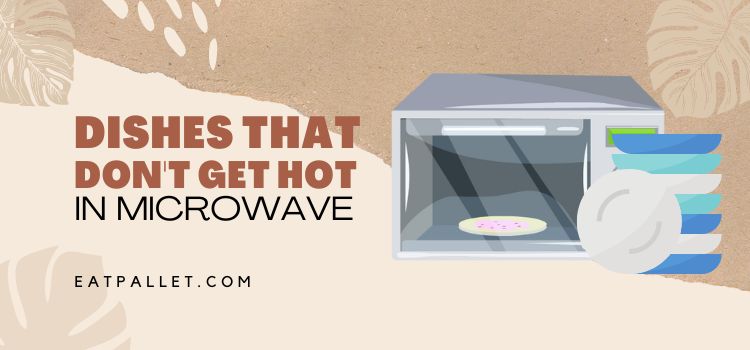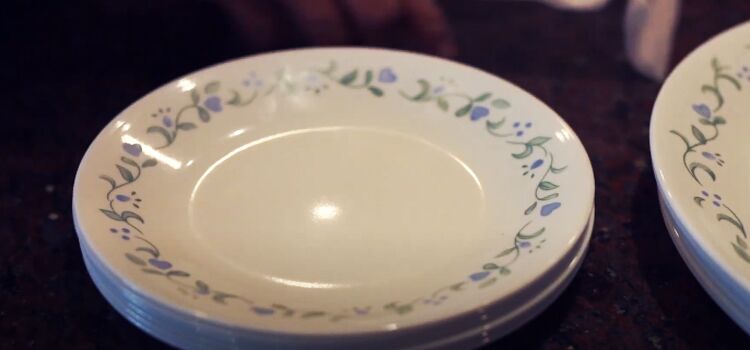There are many different types of plates that claim to not get hot in the microwave. However, some of the best options are made from ceramic, glass, or porcelain. These materials have excellent heat-resistant properties and will not transfer heat to your food.
Additionally, they are easy to clean and dishwasher safe.
When it comes to choosing the best plates that won’t get hot in the microwave, there are a few things to keep in mind. First, consider the material the plate is made out of. Some materials, like glass or ceramic, tend to absorb heat more than others.
If you’re looking for a plate that won’t get hot in the microwave, avoid these materials.Another thing to keep in mind is the size of the plate. Larger plates tend to hold heat better than smaller ones, so if you’re looking for a plate that won’t get hot in the microwave, choose a small one.
Finally, think about how you’ll be using the plate. If you’re only going to be reheating food on it, then you don’t need to worry about it getting too hot. However, if you’re planning on using it for cooking or serving food straight from the microwave, then choose a plate that won’t get too hot.
With these factors in mind, here are some of the best plates that won’t get hot in the microwave:1. Paper plates: Paper plates are lightweight and don’t hold heat well, making them ideal for use in the microwave. Just be sure to check that they’re microwavable before using them!
2. Plastic wrap: If you don’t have any paper plates handy, plastic wrap makes an excellent alternative. Simply place your food on top of a sheet of plastic wrap and microwave away! Just be sure not to touch the plastic wrap while it’s still hot.
3., 4., 5.: Glassware,, metal utensils: These items shouldn’t come as a surprise—they’re all poor conductorsof heat and therefore won’t get veryhot when microwaved.. Avoid using them unless absolutely necessary.
.
Best Microwave Safe Plates in 2022 (Top 10 Picks)
What Dinnerware Material is Best for Microwave?
When it comes to dinnerware, there are a few different options available. One option is microwave-safe material. This type of dinnerware can be used in the microwave without any worries.
It is also durable and easy to clean. Another option is non-microwave safe material. This type of dinnerware should not be used in the microwave because it can cause damage to the dinnerware or even start a fire.
Why Do My Microwave Safe Dishes Get So Hot?
If you’ve ever heated up a dish in the microwave only to find that it’s too hot to touch when it’s done, you’re not alone. It turns out that this is a common issue with microwave safe dishes, and there are a few reasons why it happens.One reason has to do with the material that your dish is made out of.
If it’s made out of something that conducts heat well (like metal), then the heat will transfer from the food to the dish more quickly and make the dish too hot to touch. Glass or ceramic dishes are better at insulating heat, so they won’t get as hot.Another reason has to do with how evenly microwaves heat up food.
Microwaves tend to heat food from the outside in, so if your dish is insulated (again, like glass or ceramic), then the inside of the food will stay cooler than the outside. This means that when you go to touch the dish, you’ll be touching the hotter part of it and burning yourself.So what can you do about this?
If you’re using a metal or other conductive dish, try covering it with a layer of paper towel or another insulator before heating up your food. And if you’re worried about touching a hot dish, use oven gloves or tongs to handle it instead. With these tips in mind, you should be able to avoid getting burned by your microwave safe dishes!
Does Porcelain Or Stoneware Get Hot in the Microwave?
When it comes to microwaving your food, there are two types of dishes that you can use: porcelain or stoneware. But which one is better for keeping your food hot?Porcelain is a type of ceramic that is made by firing clay at high temperatures.
It is non-porous and smooth, which makes it ideal for microwaving. Stoneware is also a type of ceramic, but it is made with a coarse grain clay that is fired at lower temperatures.So, which one gets hotter in the microwave?
Porcelain! Because it is non-porous, the heat from the microwave penetrates evenly throughout the dish, making sure your food stays hot. Stoneware, on the other hand, isn’t as good atconducting heat.
So while your food might start out hot when you put it in the microwave, it will likely cool down quickly once you take it out.

Credit: eatpallet.com
Plates That Don’T Get Hot in the Microwave
There are many different types of plates that don’t get hot in the microwave. The most common type is made of ceramic, but there are also ones made of glass, metal, and even plastic. Ceramic plates are the most popular because they’re affordable and durable.
Glass plates are also a good option, but they can be more expensive. Metal and plastic plates can be used, but they’re not as popular because they don’t conduct heat as well and can melt or warp in the microwave. If you’re looking for a plate that doesn’t get hot in the microwave, make sure to choose one that’s made of a material that won’t be damaged by the heat.
Conclusion
When it comes to choosing the best plates that don’t get hot in microwave, there are many factors to consider. The most important factor is the material of the plate. Some materials, like ceramic and glass, tend to stay cooler than other materials, like plastic or metal.
Other factors to consider include the size and shape of the plate, as well as the wattage of your microwave. If you’re looking for plates that won’t get hot in microwave, these tips should help you choose the best option for your needs.
